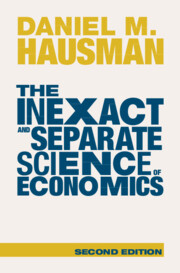Book contents
- The Inexact and Separate Science of Economics
- The Inexact and Separate Science of Economics
- Copyright page
- Contents
- Figures
- Tables
- Introduction
- Part I Introduction: Content, Structure, and Strategy of Mainstream Economics
- Part II Theory Assessment
- 9 Inexactness in Economic Theory
- 10 Mill’s Deductive Method and the Assessment of Economic Hypotheses
- 11 Methodological Revolution
- 12 Karl Popper and Imre Lakatos
- 13 The Inexact Deductive Method
- 14 Casting off Dogmatism
- Part III Conclusion
- Appendix An Introduction to Philosophy of Science
- References
- Index
12 - Karl Popper and Imre Lakatos
Falsificationism and Research Programs
from Part II - Theory Assessment
Published online by Cambridge University Press: 25 May 2023
- The Inexact and Separate Science of Economics
- The Inexact and Separate Science of Economics
- Copyright page
- Contents
- Figures
- Tables
- Introduction
- Part I Introduction: Content, Structure, and Strategy of Mainstream Economics
- Part II Theory Assessment
- 9 Inexactness in Economic Theory
- 10 Mill’s Deductive Method and the Assessment of Economic Hypotheses
- 11 Methodological Revolution
- 12 Karl Popper and Imre Lakatos
- 13 The Inexact Deductive Method
- 14 Casting off Dogmatism
- Part III Conclusion
- Appendix An Introduction to Philosophy of Science
- References
- Index
Summary
Chapter 12 criticizes Karl Poppers and Imre Lakatos’ views on theory appraisal, which have been particularly influential among writers on economic methodology, although their influence has waned. Popperian critics of economics are right to claim that economists seldom practice the falsificationism that many preach, but, in contrast to authors such as Mark Blaug (), I argue that the problem is with the preaching, not with the practice: falsificationism is not a feasible methodology. Although Lakatos provides more resources with which to defend economics than does Popper, his views are also inadequate and for a similar reason. Both Popper and Lakatos deny that there is ever reason to believe that scientific statements are close to the truth or likely to be true, and neither provides a viable construal of tendencies. In denying that such reasons to accept generalizations have a role in either engineering or in theoretical science, Popper and Lakatos are implicitly calling for a radical and destructive transformation of human practices.
Keywords
- Type
- Chapter
- Information
- The Inexact and Separate Science of Economics , pp. 302 - 334Publisher: Cambridge University PressPrint publication year: 2023

